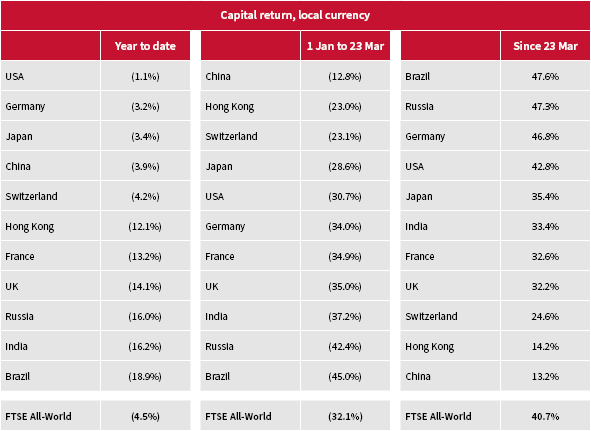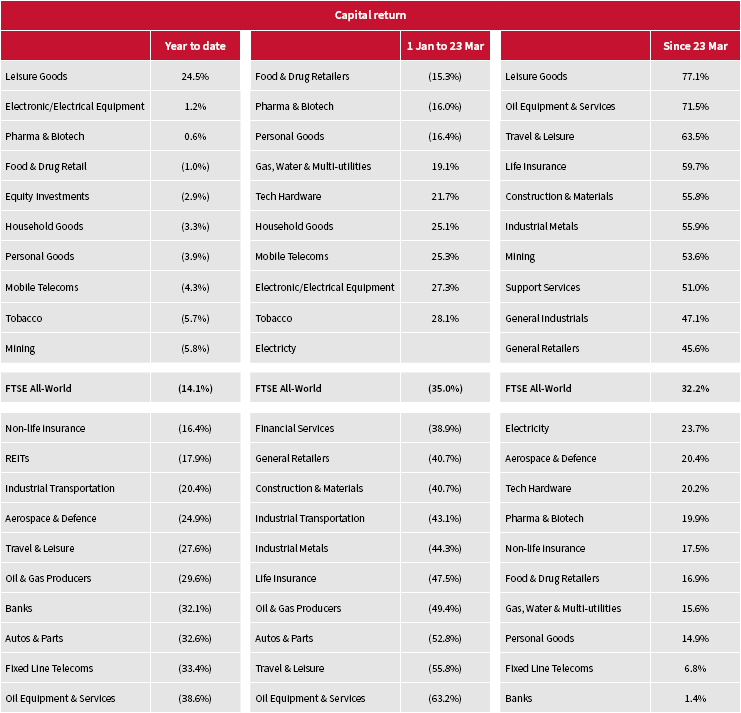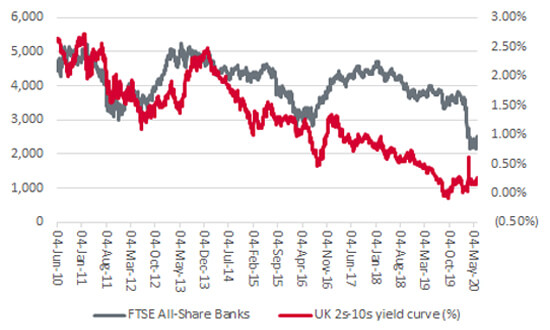


At the time of writing, the FTSE All-Share stands 32% above its March lows, which sounds pretty good, even reassuring, on the face of it.
However, that rebound means that the All-Share has still lagged the FTSE All-World over the same period. It also means that the UK has underperformed most major equity markets during the current recovery phase and indeed for the year as a whole.
“Among major markets, the UK has only outperformed India, Brazil and Russia so far in 2020 as a whole, nations where there is also debate over the quality of either Government policy or the local data on the degree of the viral outbreak – or both.”
Cynics may be tempted to argue that this is down to the clarity and efficacy – or otherwise – of the UK’s policy response to the COVID-19 crisis, since the UK has only outperformed India, Brazil and Russia so far in 2020 as a whole, nations where there is also debate over the quality of either Government policy or the local data on the degree of the outbreak – or both.
UK has been a laggard on the global equity stage in 2020

Source: Refinitiv data
However, markets usually care little for politics and, when they do worry about them, they rarely do so for long. The tenure of politicians in office – and their influence – tends to be pretty ephemeral and, ultimately, corporate profits, cash flows and dividends are the most important drivers of company valuations and thus the indices of which they are a part, although the role of central bank stimulus appears to be getting greater by the month.
No one would argue that the White House has offered a coherent policy on COVID-19 – or, for that matter, many other pressing issues – yet the US sits at the top of the performance tables for 2020 to date. And even if questions are being asked about Russia and Brazil, it is not stopping their stock markets from being the best performers since the year’s lows in late March.
Other factors above and beyond politics and COVID-19 could therefore be at work. A huge rally in oil and improvement in other commodities prices may be helping Sao Paolo’s and Moscow’s markets, while America’s well-documented strength in areas such as technology and biotechnology is being reflected in equity returns from the S&P 500 overall, as well as certain high-profile companies.
“The industry mix within an index is therefore an important factor and this is something which any client or adviser must consider when they are perhaps contemplating buying a tracker fund or even an actively-managed one.”
The industry mix within an index is therefore an important factor and this is something which any client or adviser must consider when they are perhaps contemplating buying a tracker fund or even an actively-managed one; in the latter case, they will need to assess the manager’s views on the major sectors within a country and also check whether the predominance of certain industries – such as, say, oil or defence or tobacco – means there are ethical or other grounds for giving somewhere a wide berth.
Some clues to the UK’s relative underperformance can be found in the FTSE All-Share index’s makeup and which industrial groupings have done best and worst in 2020.
There has been a wide spread of sector performance within the FTSE All-Share in 2020 to date

Source: Refinitiv data
Leisure Goods (which is essentially Warhammer gaming specialist Games Workshop) is the top performer, while relatively defensive areas such as Pharmaceuticals & Biotech, Food & Drug Retailers, Household Goods, Personal Goods and Tobacco are also among the top ten. The laggards include some areas which have been hit hardest by the lockdown, such as Travel & Leisure (and, by association with that, Aerospace & Defence), as well as Real Estate Investment Trusts, by dint of landlords’ exposure to retailers.
Some of those sectors have come roaring back since the late-March low, in the view that if revenues are down nearly 100%, then it cannot get much worse and, if it cannot get much worse, then it will soon start to get better. Hopes for a wider, global economic upturn are also giving fresh life to sectors such as Mining, Industrial Metals and General Industrials.
“The underperformers which seem to be weighing most heavily on the All-Share include the Oils (down nearly 30% for the year) and Financials.”
But the underperformers which seem to be weighing most heavily on the All-Share include the Oils (down nearly 30% for the year) and Financials, where non-life insurance (presumably owing to its business continuity, event cancellation and other outbreak-related exposures) and banks are down near the bottom of the performance tables for 2020 as a whole.
Financials represent 17% of the FTSE All-Share’s market cap, and the oils 10%, so a quarter of the index is in investors’ doghouse right now. Other substantial weightings are the index-leading 17.4% at Consumer Staples and 12.8% at Healthcare. They are both defensive in nature, so if global markets are going to stay in ‘risk-on’, recovery mode, then the UK could continue to perform less well relative to other geographic options which are more sensitive to the global economy and trade flows, such as Germany.
As a final point, the rotten performance of the banks is eye-catching. It is the single-worst performing sector since the recovery began in March. This seems odd, as the yield curve has steepened for much of the last nine months and the wider gap between the UK two- and ten-year Government bonds would normally herald higher lending margins.
Steeper UK yield curve is yet to bring succour to Banks sector

Source: Refinitiv data
Perhaps this reflects concerns that banks are being used as public utilities during the crisis, with the forced scrapping of dividends and obligations to offer fresh loans, or at least payment holidays, to corporations and consumers alike, almost regardless of whether the money can be finally paid back. Throw in HSBC’s and Standard Chartered’s political discomfort in Hong Kong and China, and it is indeed a grim time to be a bank.
This area of the website is intended for financial advisers and other financial professionals only. If you are a customer of AJ Bell Investcentre, please click ‘Go to the customer area’ below.
We will remember your preference, so you should only be asked to select the appropriate website once per device.